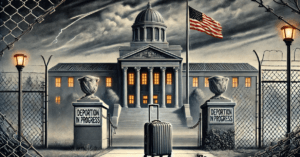Trump’s Crackdown on Campus: Deportations Target Pro-Palestinian Students
The Trump administration has intensified efforts to deport foreign-born students accused of opposing U.S. foreign policy. Recently, Mahmoud Khalil, a Palestinian graduate student, and Badar Khan Suri, an Indian postdoctoral fellow, were arrested under a rarely used law that allows deportation if a noncitizen’s presence is deemed harmful to U.S. interests. Neither has been charged with a crime, leading to legal battles and widespread criticism. Opponents argue that the arrests suppress free speech, particularly pro-Palestinian activism.
Trump and Secretary of State Marco Rubio have pledged further deportations of individuals they claim support Hamas. Columbia University has become a focal point, with other students facing visa revocations and arrests, including Ranjani Srinivasan, who fled to Canada after her visa was revoked for Gaza-related social media posts. While Trump justifies these actions as removing “anti-American” influences, critics view them as authoritarian measures to silence dissent. Khalil warned from detention that this crackdown could extend to all U.S. residents critical of the government.
Meanwhile, Suri’s wife fears she and their children could be targeted next due to her family’s past political ties. This controversy has ignited broader debates over immigration, academic freedom, and free speech in the U.S.

Trump’s Crackdown on Campus: Deportations Target Pro-Palestinian Students
The Trump administration has escalated efforts to deport international students legally studying in the U.S., accusing them of undermining American foreign policy—often without clear evidence. Two recent cases have sparked widespread controversy: Mahmoud Khalil, a Palestinian graduate student at Columbia University, was arrested on March 8, and just days later, Badar Khan Suri, an Indian postdoctoral researcher at Georgetown University, was detained. While authorities claim Suri has ties to Hamas, his lawyer argues that the real motive is his marriage to a woman of Palestinian descent. Neither Khalil nor Suri has been formally charged. Instead, officials are invoking a rarely used law that allows the deportation of noncitizens if their presence is deemed “harmful to U.S. foreign policy.”
These actions have triggered legal battles and widespread condemnation, particularly within academic communities. Critics argue that the administration is suppressing political dissent and restricting free speech, especially regarding discussions on the Israeli-Palestinian conflict. Democratic Congressman Don Beyer denounced the arrests as an attack on constitutional rights, comparing the measures to those used by authoritarian governments.
President Trump has openly defended these actions, describing them as the beginning of a broader effort to remove pro-Palestinian activists from U.S. campuses. Along with Secretary of State Marco Rubio, he has pledged to revoke visas and deport individuals accused of supporting Hamas, which the U.S. government classifies as a terrorist organization.
Columbia University has become a key focal point in this crackdown. Ranjani Srinivasan, another student, fled to Canada after her visa was suddenly revoked following her social media posts criticizing Israel’s actions in Gaza. Leqaa Kordia, a Palestinian student, was arrested for overstaying her visa, though supporters claim the decision was politically motivated.
The administration insists that these deportations are necessary to eliminate “anti-American” influences from universities. However, opponents argue that these measures dangerously undermine free expression. In a letter from detention, Khalil warned that such actions set a troubling precedent, threatening not only visa holders but also any resident who criticizes government policies.
Suri’s case adds further complexity. His wife’s father previously served as an advisor to Hamas but publicly distanced himself from the group years ago. After Suri’s arrest, his wife expressed fears that she and their children could also become targets, highlighting the deeply personal impact of these policies.
This controversy reflects broader tensions over immigration, academic freedom, and U.S. support for Israel. Civil liberties advocates warn that using deportation as a tool to suppress dissent could have lasting consequences for free speech in America. They argue that equating criticism of foreign policy with “anti-American” sentiment risks normalizing censorship and undermining the open discourse essential to a democratic society.
As legal battles continue, the cases of Khalil, Suri, and others have become focal points in the debate over how the U.S. balances national security with the rights of immigrants and freedom of expression. With universities caught in the crossfire, many fear the chilling effect these actions could have on academic research and discussion, particularly on sensitive global issues.
You must be logged in to post a comment.